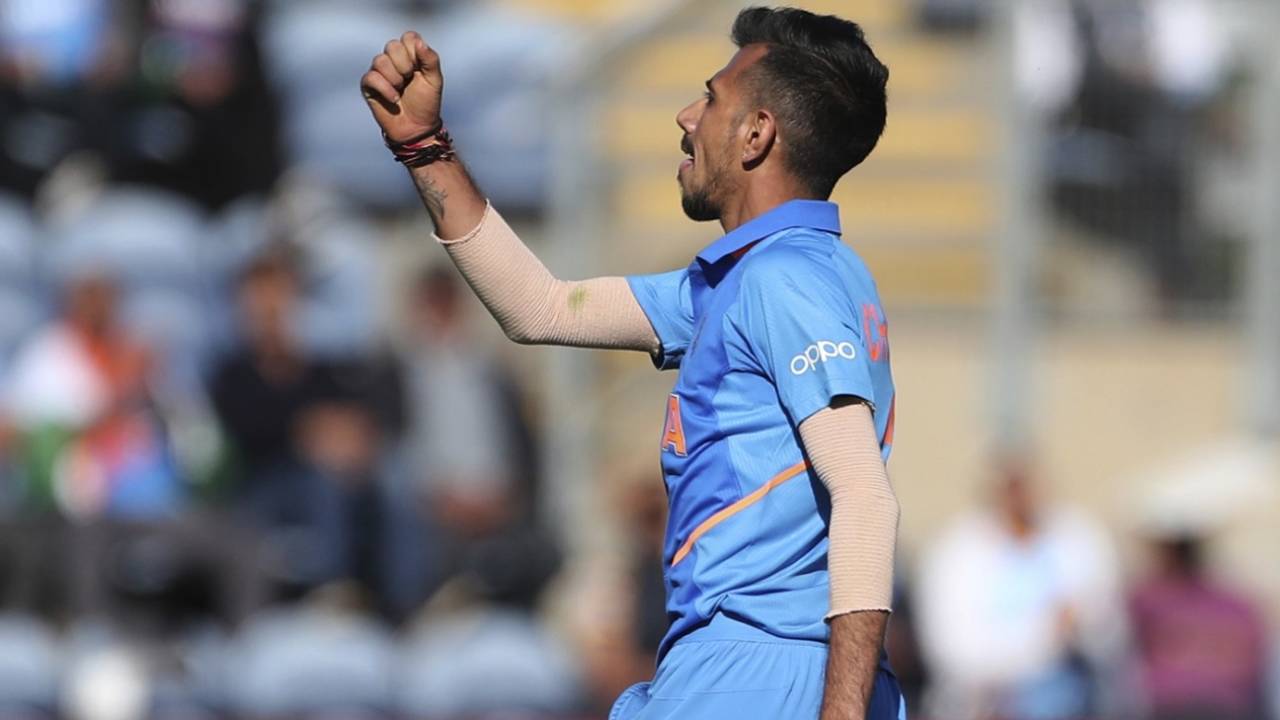Yuzvendra Chahal on the comeback trail, without ever going away
The selection for the Bangladesh T20Is shows that while the leggie may not be No.1 anymore, he's not out of the reckoning
Sidharth Monga
29-Oct-2019
Yuzvendra Chahal celebrates a wicket • Associated Press
The last week of October was a week of many comebacks in Indian cricket. Sourav Ganguly was back as captain… of the BCCI. Almost every member of the BCCI old guard was back either directly or through proxy. Sanju Samson, believe it or not, was back after having last played for India four years ago. It was also the week of Diwali, a festival that brings a new year for many communities.
Amid all these comebacks and promises of regeneration, amidst all speculation and debate over MS Dhoni, quietly snuck back an India cricketer you might swear was never gone. Not long ago Yuzvendra Chahal was one half of the duo that gave India an unparalleled edge over others in limited-overs cricket. They were the point of difference between India and the rest of the world. Then, during the World Cup, things began to change.
In Birmingham, England attacked both Chahal and Kuldeep Yadav to the short boundary; Chahal went for 88. In the Manchester semi-final, Yadav was dropped and Chahal conceded 63, the most expensive bowler of the game. Also post World Cup, India began to concentrate on the shorter of the two limited-over formats. India said they were practically building the T20I team from scratch in the year before the T20 World Cup in Australia, late in 2020. Apart from five-six ODI players, nobody was certain to get picked, coach Ravi Shastri said.
One of the first experiments in the team was to do away with the ultra-aggressive line-up of two wristspinners, who couldn't bat. "If all teams across the world are batting till 9, 10, why can't we?" captain Virat Kohli said. So out went Chahal and Yadav, and in came Ravindra Jadeja, Krunal Pandya and Washington Sundar.
Fair enough, you'd say if you were Chahal, who after all is India's third-highest wicket-taker in Twenty20 internationals and also holds the best strike rate for an Indian spinner in all T20 cricket. However, India didn't completely give up on wristspin. They in fact picked another wristspinner who didn't necessarily bat better than Chahal or Yadav: Rahul Chahar. That is what would have been a cause for concern for Chahal and Yadav. They can't have forgotten how they swooped in when given a chance and didn't let R Ashwin and Jadeja get a look back in for two years. Ashwin, if it needs reminding, is still India's most successful bowler in T20Is.
This selection for the Bangladesh T20Is, though, would have brought relief to Chahal. The message is clear: while you are no more the No. 1 pick, by no means are you out of the reckoning. More importantly, there hasn't been a stand-out performer in the last two series who has rendered you redundant. The same might go for Yadav, who might come back for one of the two other home series later in the season.
Yet the way they talk about Chahal has changed now. In the press conference after the selection, MSK Prasad, the chairman of the selection committee said they "wanted to try out Chahal". That's a big fall from being the equal-first choice along with Yadav just before the World Cup.
The path back must have been easier for Chahal than it will be for Yadav: only two spinners took more wickets than Chahal in the last IPL whereas Yadav's tournament was a forgettable one, playing only nine games, taking only four wickets and going at close to nine an over.
This is a more pragmatic Indian team where only one wristspinner seems to be viable, largely because wristspinners don't bat well (Shreyas Gopal wants you to hold his drink, though). In what seems to be a three-horse race between himself, Yadav and Chahar (again Gopal wonders why, never mind an ordinary Vijay Hazare Trophy), Chahal will want to make all the big moves whenever he get his opportunity against Bangladesh.
Sidharth Monga is an assistant editor at ESPNcricinfo
